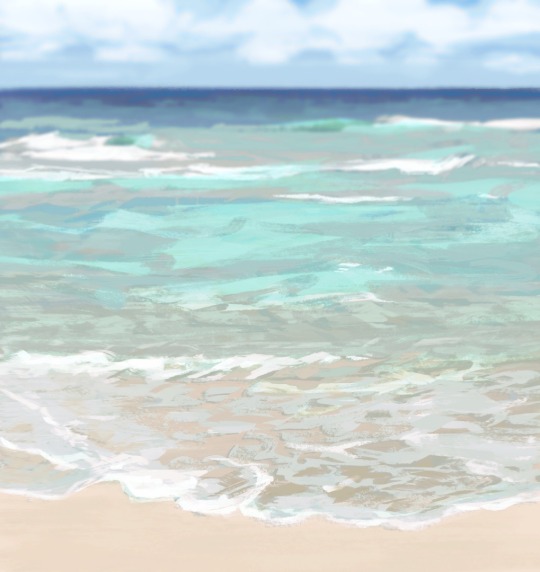#Environment
Text
"People assume that in the 50 years since the first Earth Day we've made no progress. That we're in a worse position now than we were in the 1970s, that there's no point in environmental action," [...]
Quite the opposite is true. Climate-friendly advances that would have seemed impossible even 10 years ago are now commonplace. And three times in the past 50 years humanity has faced--and fixed--massive, man-made global environmental issues.
The fight isn't won yet, but don't forget that we have made enormous progress.
We would be in a much, much worse position if it wasn't for all the incredible work of environmental activists who came before us, most of whose names and contributions we will never know. They are the reason that we have a fighting chance now, and we owe it to them to pick up their banner and keep running.
#earth day#climate change#environment#global warming#hope#climate anxiety#climate grief#ecoanxiety#ecogrief
952 notes
·
View notes
Text
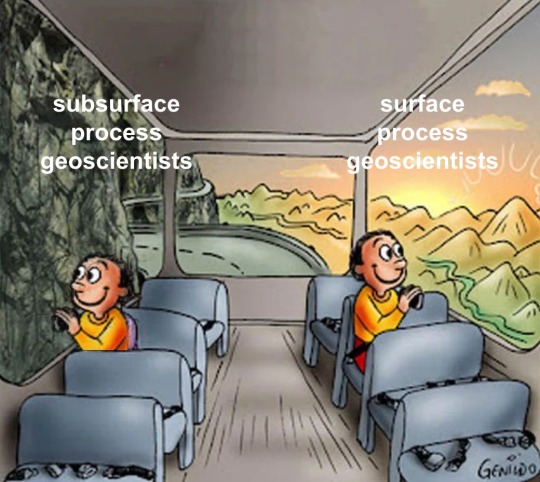
333 notes
·
View notes
Text

#never trump#republican assholes#climate change#ecology#environment#green jobs#sustainability#corporate greed#maga morons#climate crisis#climate activism#climate deniers
267 notes
·
View notes
Text
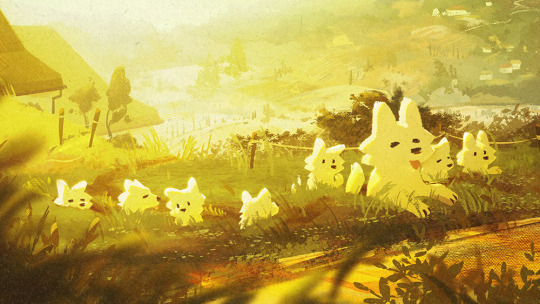
Just some lil guys!
#dog#doodle#wolf#canine#art#artwork#drawing#design#cartoon#cartoony#visualdevelopment#visdev#visdevart#illustration#painting#digitalpainting#animal#landscape#environment#nature#background#backgroundart
234 notes
·
View notes
Text
Okay. This is a pretty big deal in the world of mycology. Historically fungi have been divided up into either parasites that siphon resources from plants, mutualists that cooperate with them, or saprotrophs that break down decaying organic matter (plant and otherwise.) The genus in question, Mycena, has traditionally been made of saprotrophic species feeding on decaying wood.
However, what scientists are observing is Mycena fungi displaying primitive mutualistic behaviors, specifically providing living plants with nitrogen and getting carbon in return from a living partner, or getting to chow down on the plant's remains once deceased. This shows a significant level of adaptability that hasn't been observed in fungi beforehand, though given how much we don't know about fungi there's a good possibility this isn't an unprecedented event.
It doesn't surprise me one bit that we're seeing this in Mycena. These fungi are especially opportunistic; in fact, that mushroom growing out of a frog's skin that we saw a while back was also a Mycena species. Perhaps we need to add bonnet mushrooms to raccoons, dandelions, and other hardy generalists as symbols of scrappy survival in spite of environmental pressures.
#Mycena#bonnet mushrooms#mushrooms#mushroom#fungi#fungus#mycelium#mycology#botany#biology#nature#science#scicomm#evolution#environment#ecology#mutualism#mycorrhizal fungi
205 notes
·
View notes
Text
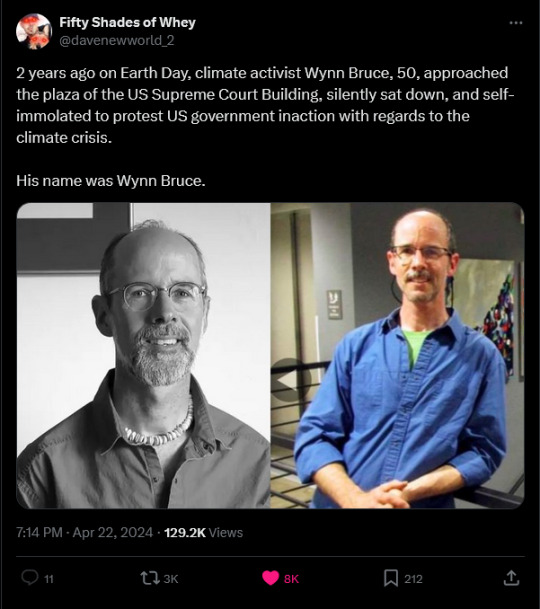
#earth day#leftism#socialism#communism#anti capitalism#anarchy#ecosystem#environment#ecology#eco#save the planet#go green#save the earth#recycle#april 22#save the bees#twitter x#save the children
154 notes
·
View notes
Text
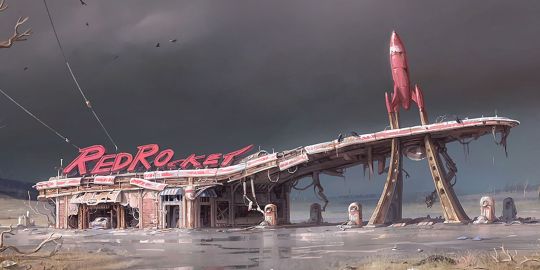

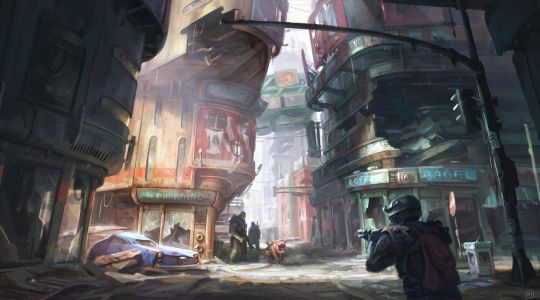
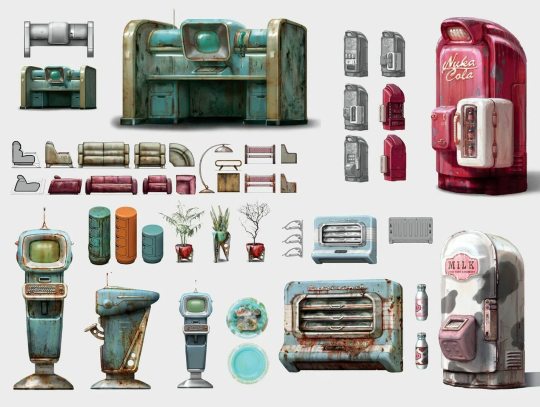
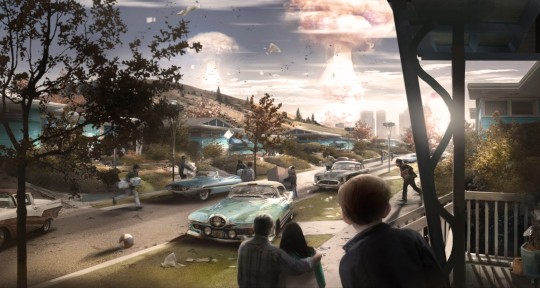
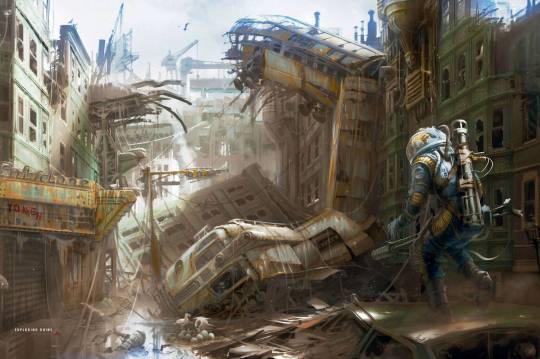

#art#cyberpunk#scifi#lineart#concept art#cgart#props#fallout#fallout 4#environment#post apocalypse#post punk#vintage scifi
83 notes
·
View notes
Text

Happy Earth Day!
#my art#red panda#mammals#sciart#digital art#artblr#artists of tumblr#wildlife art#redpanda#animal#animal artist#digital painting#natural history art#nature art#nature#conservation#environment#krita
75 notes
·
View notes
Text
#environment#christen harper#erica campbell#اقتباسات#filmgifs#dean x reader#mentesexpostas#follow for follow#gadisnakal#beauty tips#elizabeth marxs#classic academia#batman#tabria majors
125 notes
·
View notes
Text
#moreid#environment#day6#christen harper#philippines#san#erica campbell#tumblr girl#Assassins Creed#اقتباسات#warframe#rainbow dash
122 notes
·
View notes
Text

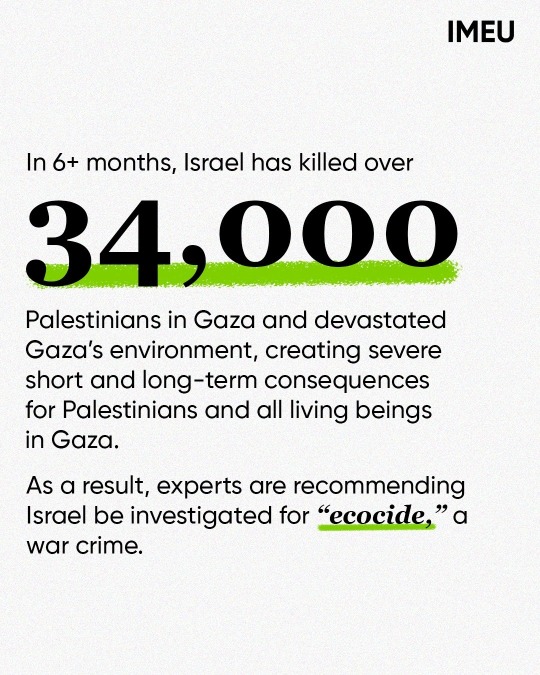
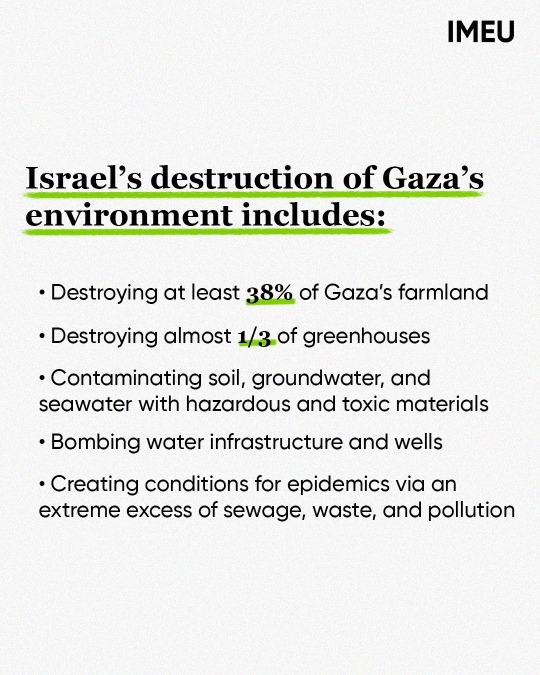

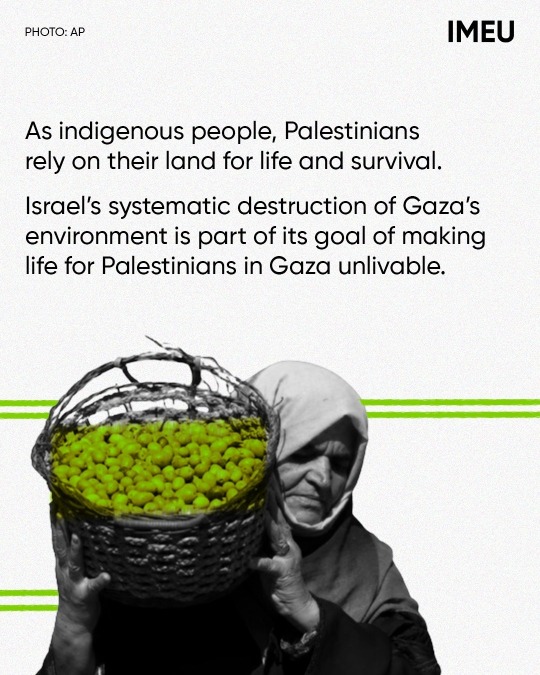
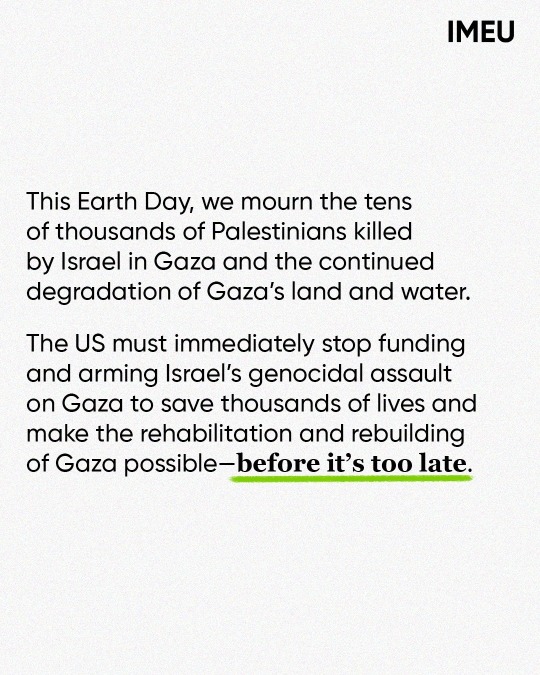
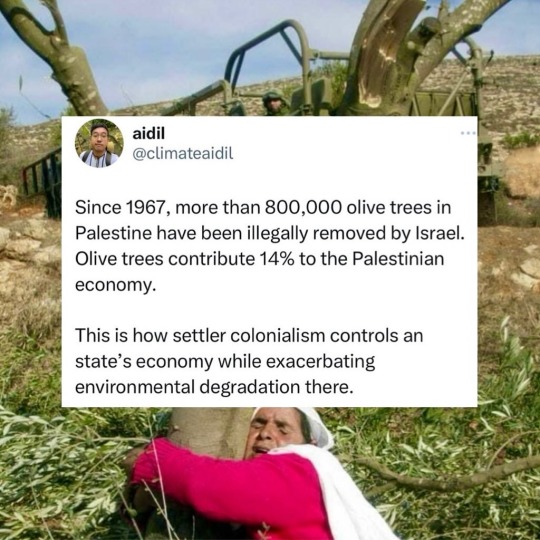
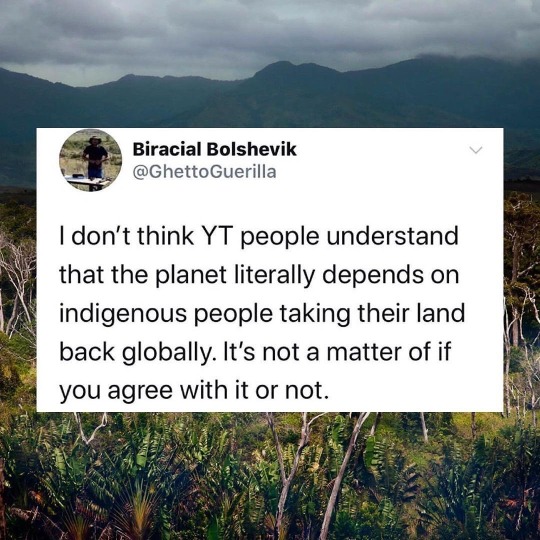
🌿An Earth Day fusion repost from @theimeu and @muchachafanzine.
🌿In honor of Earth Day, please visit @zaytoun_cic, @handmadepalestine, or @plant.eenolijfboom to plant an olive tree in Palestine. 🕊
🌿From @theimeu:
This Earth Day, we mourn the 34,000+ Palestinians killed by Israel in Gaza and Israel’s continued degradation of Gaza’s land, water, and other natural resources that make life possible for Palestinians.
In the past 6 months alone, Israel has destroyed farmland and greenhouses, contaminated natural resources with hazardous materials, bombed key water purifying infrastructure and wells, and created conditions for epidemics caused by an extreme excess of sewage, waste, and pollution.
Israel’s systematic destruction of Gaza’s environment is part of its goal of making life for Palestinians in Gaza unlivable.
Link in bio to contact your reps and urge an immediate, permanent ceasefire and the immediate suspension of all arms and funds to Israel.
Sources: The Guardian, Scientific American
🌿From @muchachafanzine:
Reminder this #EarthDay that from Turtle Island to Pa1estine, your environmentalism doesn’t mean sh!t if you don’t support giving the #LandBack to Indigenous people. 🤷🏽♀️
#land back#indigenous rights#indigenous resistance#indigenous peoples#human rights#palestine#free palestine#gaza#ecocide#ecology#environmental activism#environment#olive trees#free gaza#stop the genocide#earth day#natural resources#farming#land stewardship#israel#israel is committing genocide#israel is a terrorist state#israeli apartheid#israeli occupation#end the occupation#ceasefire now
69 notes
·
View notes
Text
#environment#day6#christen harper#philippines#erica campbell#اقتباسات#warframe#filmgifs#dean x reader#mentesexpostas
125 notes
·
View notes
Text
Oh boy I'm getting within shooting range of 1000 followers! That makes me happier than a shoebill in a swamp!

I kinda wanna do something special for 1000 subs. What should I do?
42 notes
·
View notes
Text

Title: Passagem de Humaitá
Artist: Victor Meirelles
Year: 1886
Medium: gouache on paper
Image source: https://artsandculture.google.com/asset/estudo-para-passagem-de-humaitá-victor-meirelles/OQFEZMiH3O4dZg
#painting#landscape#ocean#sea#blue#blue aesthetic#grey#grey aesthetic#meloncholy#environmental art#environment#painting inspiration#art inspiration#color theory#color inspiration#cool colors#cool art#composition#history painting#history#adventurecore#artcore#fine art#ominous#oceancore#artwork#inspiration#inspo#nature#naturecore
25 notes
·
View notes
Text

A.2.6 Why is solidarity important to anarchists?
Solidarity, or mutual aid, is a key idea of anarchism. It is the link between the individual and society, the means by which individuals can work together to meet their common interests in an environment that supports and nurtures both liberty and equality. For anarchists, mutual aid is a fundamental feature of human life, a source of both strength and happiness and a fundamental requirement for a fully human existence.
Erich Fromm, noted psychologist and socialist humanist, points out that the “human desire to experience union with others is rooted in the specific conditions of existence that characterise the human species and is one of the strongest motivations of human behaviour.” [To Be or To Have, p.107]
Therefore anarchists consider the desire to form “unions” (to use Max Stirner’s term) with other people to be a natural need. These unions, or associations, must be based on equality and individuality in order to be fully satisfying to those who join them — i.e. they must be organised in an anarchist manner, i.e. voluntary, decentralised, and non-hierarchical.
Solidarity — co-operation between individuals — is necessary for life and is far from a denial of liberty. Solidarity, observed Errico Malatesta, “is the only environment in which Man can express his personality and achieve his optimum development and enjoy the greatest possible wellbeing.” This “coming together of individuals for the wellbeing of all, and of all for the wellbeing of each,” results in “the freedom of each not being limited by, but complemented — indeed finding the necessary raison d’etre in — the freedom of others.” [Anarchy, p. 29] In other words, solidarity and co-operation means treating each other as equals, refusing to treat others as means to an end and creating relationships which support freedom for all rather than a few dominating the many. Emma Goldman reiterated this theme, noting “what wonderful results this unique force of man’s individuality has achieved when strengthened by co-operation with other individualities . .. co-operation — as opposed to internecine strife and struggle — has worked for the survival and evolution of the species… . only mutual aid and voluntary co-operation … can create the basis for a free individual and associational life.” [Red Emma Speaks, p. 118]
Solidarity means associating together as equals in order to satisfy our common interests and needs. Forms of association not based on solidarity (i.e. those based on inequality) will crush the individuality of those subjected to them. As Ret Marut points out, liberty needs solidarity, the recognition of common interests:
“The most noble, pure and true love of mankind is the love of oneself. I want to be free! I hope to be happy! I want to appreciate all the beauties of the world. But my freedom is secured only when all other people around me are free. I can only be happy when all other people around me are happy. I can only be joyful when all the people I see and meet look at the world with joy-filled eyes. And only then can I eat my fill with pure enjoyment when I have the secure knowledge that other people, too, can eat their fill as I do. And for that reason it is a question of my own contentment, only of my own self, when I rebel against every danger which threatens my freedom and my happiness…” [Ret Marut (a.k.a. B. Traven), The BrickBurner magazine quoted by Karl S. Guthke, B. Traven: The life behind the legends, pp. 133–4]
To practice solidarity means that we recognise, as in the slogan of Industrial Workers of the World, that “an injury to one is an injury to all.” Solidarity, therefore, is the means to protect individuality and liberty and so is an expression of self-interest. As Alfie Kohn points out:
“when we think about co-operation… we tend to associate the concept with fuzzy-minded idealism… This may result from confusing co-operation with altruism… Structural co-operation defies the usual egoism/altruism dichotomy. It sets things up so that by helping you I am helping myself at the same time. Even if my motive initially may have been selfish, our fates now are linked. We sink or swim together. Co-operation is a shrewd and highly successful strategy — a pragmatic choice that gets things done at work and at school even more effectively than competition does… There is also good evidence that co-operation is more conductive to psychological health and to liking one another.” [No Contest: The Case Against Competition, p. 7]
And, within a hierarchical society, solidarity is important not only because of the satisfaction it gives us, but also because it is necessary to resist those in power. Malatesta’s words are relevant here:
“the oppressed masses who have never completely resigned themselves to oppress and poverty, and who … show themselves thirsting for justice, freedom and wellbeing, are beginning to understand that they will not be able to achieve their emancipation except by union and solidarity with all the oppressed, with the exploited everywhere in the world.” [Anarchy, p. 33]
By standing together, we can increase our strength and get what we want. Eventually, by organising into groups, we can start to manage our own collective affairs together and so replace the boss once and for all. ”Unions will… multiply the individual’s means and secure his assailed property.” [Max Stirner, The Ego and Its Own, p. 258] By acting in solidarity, we can also replace the current system with one more to our liking: “in union there is strength.” [Alexander Berkman, What is Anarchism?, p. 74]
Solidarity is thus the means by which we can obtain and ensure our own freedom. We agree to work together so that we will not have to work for another. By agreeing to share with each other we increase our options so that we may enjoy more, not less. Mutual aid is in my self-interest — that is, I see that it is to my advantage to reach agreements with others based on mutual respect and social equality; for if I dominate someone, this means that the conditions exist which allow domination, and so in all probability I too will be dominated in turn.
As Max Stirner saw, solidarity is the means by which we ensure that our liberty is strengthened and defended from those in power who want to rule us: “Do you yourself count for nothing then?”, he asks. “Are you bound to let anyone do anything he wants to you? Defend yourself and no one will touch you. If millions of people are behind you, supporting you, then you are a formidable force and you will win without difficulty.” [quoted in Luigi Galleani’s The End of Anarchism?, p. 79 — different translation in The Ego and Its Own, p. 197]
Solidarity, therefore, is important to anarchists because it is the means by which liberty can be created and defended against power. Solidarity is strength and a product of our nature as social beings. However, solidarity should not be confused with “herdism,” which implies passively following a leader. In order to be effective, solidarity must be created by free people, co-operating together as equals. The “big WE” is not solidarity, although the desire for “herdism” is a product of our need for solidarity and union. It is a “solidarity” corrupted by hierarchical society, in which people are conditioned to blindly obey leaders.
#faq#anarchy faq#revolution#anarchism#daily posts#communism#anti capitalist#anti capitalism#late stage capitalism#organization#grassroots#grass roots#anarchists#libraries#leftism#social issues#economy#economics#climate change#climate crisis#climate#ecology#anarchy works#environmentalism#environment#solarpunk#anti colonialism#mutual aid#cops#police
33 notes
·
View notes
